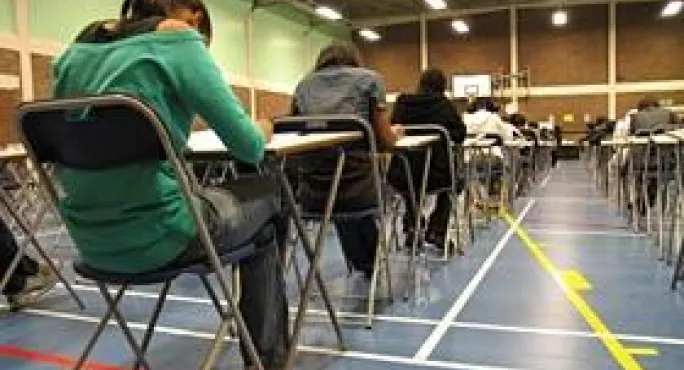O level plan: revolutionary for sure...

For once the headlines are no exaggeration. If enacted, the Government proposals, leaked today, to abolish the secondary national curriculum and bring back O levels and CSEs, really would be “the biggest revolution in education for 30 years”.
Indeed it is arguable that there has not been such a sweeping transformation of secondary schools since the introduction of comprehensives more than half a century ago. And that was a reform that took place gradually over three decades.
Many already fear the changes Michael Gove now wants will undo all that and take England back to a two-tier system, instantly locking down the aspirations and life chances for a quarter of all pupils. And the education secretary apparently wants to achieve it in one big bang.
The secondary national curriculum would be withdrawn from September 2013, with the freedoms over what to teach currently given to academies, extended to all secondaries.
A year later pupils would start studying for “explicitly harder” O level style exams in English, maths, physics, chemistry and biology. There would also be “tough O levels” in history, geography and modern languages, though it is not clear whether they would be introduced at the same time.
Exam boards would start bidding for the exclusive rights to develop each of these new qualifications this summer. The Department for Education reportedly expects GCSEs to then gradually disappear, encouraged by the scrapping of GCSE targets.
Most controversial of all is the plan for “less intelligent” pupils - “the bottom 25 per cent” - to sit simpler, more straightforward CSE style exams.
Mr Gove is nothing if not brave. If his plans, bound to be fiercely resisted in many quarters, go ahead they will force many in education to face up to some very uncomfortable truths.
For years rising results have told the story of a steadily improving schools system.
A level of qualification - five or more “good” GCSEs - once only expected of a minority of pupils has gradually come to be seen as a realistic aspiration for all, whatever their social background. Indeed schools have been officially castigated and turned into academies for failing to take it seriously enough.
Now with the end of league table equivalents, and the introduction of harder exams, that tale of progress is likely to be stopped in its tracks. That is intentional - Mr Gove believes that although there have been some improvements in standards over the last 20 years, they have not been enough.
As he told Parliament this morning his reforms are aimed at ensuring “our education system stands comparison with the world’s most rigorous”.
But in practice they will probably also shine a much harsher light on the gulf in achievement between pupils from the poorer backgrounds and their richer counterparts. The end of the GCSE and its often dubious league table “equivalents”, are likely to show that gap is much wider than many had hoped and claimed.
Mr Gove and his supporters will be happy with that if it means greater “rigour” has been introduced. They may be less comfortable with the stain it is likely to put on the records of many academies, hitherto regarded as successful in achieving in the most deprived areas and held up as exemplars for the benefits of greater school autonomy.
The changes are also unlikely to undermine the radical, progressive edge to much of Mr Gove’s rhetoric - the idea that his reforms are aimed at ensuring that all pupils, whatever their background can fulfiltheir educational potential.
That idealistic zeal would lose much of its impetus if the education secretary then decides, as is being reported, that the bottom 25 per cent should study for exams that “emphasise real life situations like counting change in a shop or reading a railway timetable”.
Conservative traditionalists who hanker for return to grammar schools may welcome this as a realistic acceptance of life’s inequalities. But idealistic charter and free school pioneers who argue for the 100 per cent school - a school where all pupils without special needs achieve good results regardless of background - will be bitterly disappointed.
Teaching union leaders are already furious and there will be opposition from many other quarters, not least the exam boards.
It has been said that the franchising system now being proposed will lead to series of entrenched monopolies. Once an exam board has won a contract, the other boards will have no incentive to maintain expertise in that subject, leaving only one obvious winner when the contract comes up again, the argument goes. Whatever happens, the boards would undoubtedly face a huge loss of income.
For good or for ill Mr Gove appears determined to go down as the most reforming education secretary in decades. But he will face the fight of his life to get there.
Related articlesIn the news: GCSEs to be axed in favour of return to O levelsFrom The TES archive, June 12, 1987: Time to bury O levels
In the news: GCSEs to be axed in favour of return to O levelsFrom The TES archive, June 12, 1987: Time to bury O levels
From The TES archive, June 12, 1987: Time to bury O levels
Keep reading for just £1 per month
You've reached your limit of free articles this month. Subscribe for £1 per month for three months and get:
- Unlimited access to all Tes magazine content
- Exclusive subscriber-only stories
- Award-winning email newsletters



